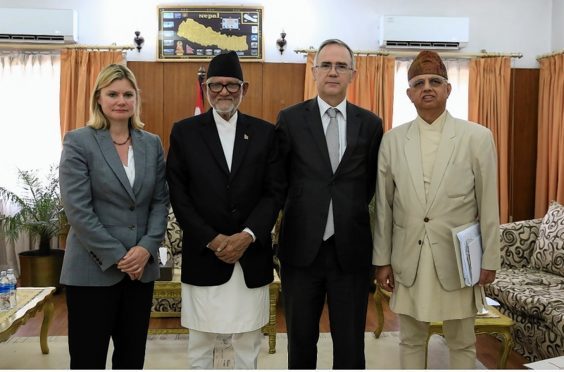A former Aberdeen law lecturer turned diplomat has spoken of his “baptism of fire” upon arriving in Nepal just six days before the earthquake.
It was John Rankin’s first day off in his new job as the UK Government’s ambassador to the country when the 7.8 magnitude shock hit in April.
He immediately found himself at the centre of an emergency disaster relief operation, which included the deployment of a 100-strong UK international search and rescue team.
Among them were members of the Scottish Fire and Rescue Service, including officers from the north-east, as well as a specialist dog.
They were sent to an area east of Kathmandu to provide first aid, search the rubble for trapped survivors and make a hospital safe.
The embassy’s role also involved supporting some 500 British nationals who were in the country at the time.
Several months on, Mr Rankin, who is now back in the UK, said many challenges remain, especially with the onset of winter.
“We are now in a situation where winter is setting in and there is still a need to get people into shelters and provide them with blankets,” he said.
“That’s work we are continuing to do. Longer-term, there’s the task of physical reconstruction.
“Nepal is the 16th poorest country in the world. It does need continuing assistance.”
He also praised the generosity of the British people, who he said had contributed more than £85million to the relief appeal.
Mr Rankin, from Renfrewshire, taught international law at Aberdeen University from 1984 to 1988, before joining the foreign office as a lawyer.
After 10 years, he became a general diplomat, serving among other posts as consular-general in Boston and high commissioner to Sri Lanka.
During his time in the latter, he received regular training for another Tsunami, but the earthquake was his first “live crisis”.
He said the embassy was prepared with enough supplies stockpiled there to last 100 people 30 days.
But he added: “What you realise is that no two crises are the same.
“It was a baptism of fire, but it’s what we are trained for. You felt it was important work you were doing.”
Asked about the importance of the UK Government’s humanitarian role, he said: “This was a situation in a very poor country absolutely devastated by a very serious earthquake.
“I think it’s right in those circumstances that the British Government help.”
Over the last two years, the UK Government through the department for international development (Dfid) has provided more than £170million to help reduce poverty and promote economic development in Nepal.
